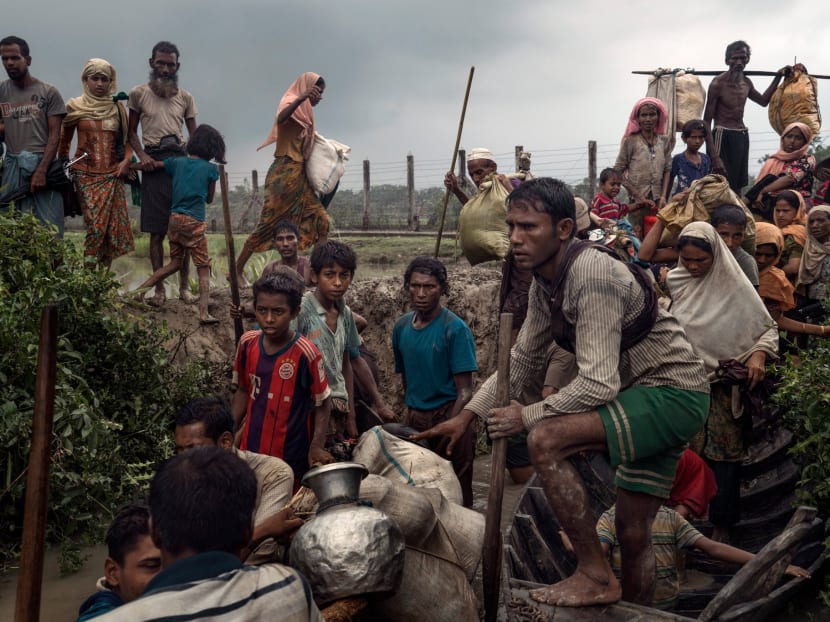Floods and disease threaten Rohingya refugees as monsoon looms
BANGLADESH — Rohingya refugees who have fled ethnic violence in Myanmar are at risk of “a humanitarian crisis within the crisis” as the impending monsoon season threatens to flood camps and fuel the spread of disease, diplomats at the United Nations Security Council warned Tuesday (Feb 13).

Rohingya refugees who have fled ethnic violence in Myanmar are at risk of “a humanitarian crisis within the crisis” as the impending monsoon season threatens to flood camps and fuel the spread of disease. Photo: The New York Times
BANGLADESH — Rohingya refugees who have fled ethnic violence in Myanmar are at risk of “a humanitarian crisis within the crisis” as the impending monsoon season threatens to flood camps and fuel the spread of disease, diplomats at the United Nations Security Council warned Tuesday (Feb 13).
More than 100,000 refugees living in makeshift camps in Bangladesh are in areas prone to flooding and landslides, and tens of thousands will have to be relocated before the monsoons hit in March, said Mr Filippo Grandi, the UN High Commissioner for Refugees.
“Their lives are greatly at risk,” Mr Grandi said.
Though the stream of refugees pouring over the border into Bangladesh has abated somewhat, the Rohingya, a long-persecuted Muslim minority predominantly in western Myanmar, continue to flee their homes. About 1,500 have already arrived in Bangladesh this month, bringing with them reports of continued violence by Myanmar’s authorities, including the abduction of girls and young women, enslavement and forced starvation, said Mr Masud Bin Momen, Bangladesh’s ambassador to the United Nations.
Calling the Rohingya among the “most persecuted minority in the world,” Mr Momen said that despite an agreement between Bangladesh and Myanmar for the voluntary repatriation of the refugees, most do not feel safe enough to return home, even if they have homes to return to.
Sweden’s representative to the Security Council, Mr Carl Skau, who warned of the unfolding “crisis within the crisis,” described conditions in the camps as dire.
As many as 700,000 Rohingya have fled to camps in Bangladesh since last August, when attacks on police posts by Rohingya insurgents in Rakhine state in western Myanmar provoked a vicious backlash by the military and local Buddhists. At least 6,700 Rohingya, including 730 children younger than 5, were killed, according to Doctors Without Borders, and hundreds of villages were destroyed in what the United States and other countries have called a campaign of “ethnic cleansing.”
Myanmar’s government, which does not recognize the Rohingya as a distinct ethnic group, has denied that members of the military carried out mass killings. Any military actions in the region, the government says, were in response to the threat posed by Rohingya militants.
Myanmar’s ambassador to the United Nations, Mr Hau Do Suan, told the Security Council on Tuesday that the government would investigate reports of mass graves and extrajudicial killings by security forces, although it has so far blocked access to the region by a UN fact-finding mission and all but a few aid organisations.
Much of the information that has emerged from Rakhine state has come from journalists, though Myanmar’s authorities have cracked down on independent reporting. In December, two Reuters reporters were arrested after gathering information about mass killings by the military and police forces, as well as by villagers. The reporters remain in custody despite calls from the UN secretary-general and others for their release.
On Tuesday, PEN America announced that the two reporters, Mr Wa Lone and Mr Kyaw Soe Oo, would receive the PEN/Barbey Freedom to Write Award. In her remarks at the Security Council, Ms Nikki Haley, the US ambassador to the United Nations, called them and other journalists in the region “an indispensable source of information.”
Both have been charged under the colonial-era Official Secrets Act and face up to 14 years in prison. Their investigation, published by Reuters last week, includes admissions from ethnic Rakhine Buddhists that they had taken part in the killing of 10 Rohingya men in the village of Inn Din in Rakhine state.
The report cited family members and witnesses who said the men appeared to have been pulled randomly from a group of hundreds of Rohingya who had sought refuge on a beach after an attack on their village. They included fishermen, an Islamic teacher and two teenage students.
In the Security Council on Tuesday, Mr Miroslav Jenca, the assistant secretary-general for political affairs, called the events described in the report “deeply disturbing,” and the French ambassador, Mr Franois Delattre, said they “could constitute crimes against humanity.”
Mr Suan, Myanmar’s ambassador, said his country’s investigation found that the men had belonged to a Rohingya militant group. They were arrested on Sept 1 last year and executed the next day before they could be handed over to the police, he said.
“Actions are being taken against 16 individuals including army and police officers and some villagers who had acted in violation of standard operating procedures and the rules of engagement,” he said. Whether the 16 had been arrested and would be prosecuted was not immediately clear. THE NEW YORK TIMES






